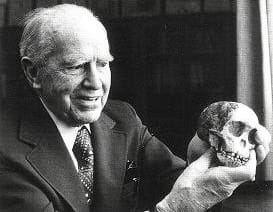Numbskulls at University and Beyond...
Morris Hirsch confronted Nazism in student politics in his 4th or 5th year, 1936 or '37. Hitler defied the West, where the Establishment favored appeasement anyway. The onslaught on German Jewry was in full swing.

Morris Hirsch confronted Nazism in student politics in his 4th or 5th year, 1936 or '37. Hitler defied the West, where the Establishment favored appeasement anyway. The onslaught on German Jewry was in full swing.
Afrikaner Nationalism gained power in 1924 and, still ascendent, was of course committed to segregation and eliminated the non-racial franchise of the Cape in the early 1930's. Dr. Verwoerd, editor of the Afrikaans daily newspaper, Die Transvaaler, was hostile to the British Commonwealth and favored Germany. He was virulently opposed to accepting German Jews into South Africa. He was the architect of Apartheid. He became Prime Minister in 1958, led South Africa out of the Commonwealth and was assassinated in 1966.
The rise of anti-Jewish feeling amongst many Afrikaners was strong in spite of traditionally amicable Afrikaner/Jewish relations, which had so impressed Morris' father.
In the medical school common room and library Die Transvaaler was provided along with the English daily newspapers and Die Burger, a less extreme Pretoria Afrikaans daily. Its presence was unacceptable to the Jewish as well as the majority of the largely liberal English students. Jews made up about one third of the medical student body. Feelings ran high as it became more strident with every political development.
Requests to the Dean's office to remove it was rejected on the grounds that freedom of the press was an essential part of academic freedom. There was no petition from the Student Medical Council. The Council, English, Afrikaans and Jewish, was just short of a liberal majority for such a petition.
Fortuitously, there was a by-election to fill two seats. Five candidates presented themselves for the vacancies, including Morris. He campaigned that the official subscription would be cancelled.
Topping the poll comfortably, the resolution was passed at the first meeting by a single vote. But when the Afrikaans students noticed Die Transvaaler's absence, all hell broke loose. Morris' Afrikaans friends, 'Lang'(Long) and 'Kort'(Short) Snyman were furious with him and told him that only now were they themselves antisemitic. They put him in coventry.
He was threatened with violence. His Jewish and English associates insisted that he should never be alone. The Afrikaans students boycotted lectures and clinics. The Dean was Professor Raymond Dart, long derided for the discovery the Taungs skull that revolutionized the theory of human evolution. They served him with an ultimatum that the boycott would continue until Die Transvaaler was reinstated in the common room. Professor Dart cancelled the official subscriptions of all the daily and weekly news publications. That sparked general student resentment. Morris' popularity plunged but he sensed he was still respected.
Morris served on the Student Medical Council, and the Student Representative Council, which served the whole university student body, for two years. This taste of politics made him realise that he had to be at the decision-making table to have an impact on society, rather than try to persuade, beseech or petition decision makers. He always had the zeal of a reformer and problem solver.
But like Professor Raymond Dart, whose theory that humans evolved in Africa was long ignored, he found that the decision makers themselves had frustrating constraints and had to limit their objectives. Professor Dart let the skull be and concentrated on being Professor of Anatomy and Dean of the Medical School.
Morris tackled much more complex governance in Que Que's Municipality, followed by constitutional negotiations in Southern Rhodesia–and then went back to being a doctor. Later, he became Chief Medical Officer at ESKOM, the huge national electricity supplier in South Africa. There he designed the medical safeguards for South Africa's first nuclear power station, despite having no degree in nuclear medicine.
The historical novel Whitewashed Jacarandas and its sequel Full of Possibilities are both available on Amazon as paperbacks and eBooks.
These books are inspired by Diana's family's experiences in small town Southern Rhodesia after WWII.
Dr. Sunny Rubenstein and his Gentile wife, Mavourneen, along with various town characters lay bare the racial arrogance of the times, paternalistic idealism, Zionist fervor and anti-Semitism, the proper place of a wife, modernization versus hard-won ways of doing things, and treatment of endemic disease versus investment in public health. It's a roller coaster read.
Excerpt from Dr. Morris Isaac Hirsch's Memoirs: Hirsch Archives.
Photo reference:
https://www.bradshawfoundation.com/news/origins.php?id=Taung-Child-Skull

